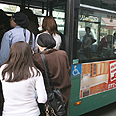
“We do not know what the direct and indirect effect of this ruling will be, yet we know that we cannot accept forced discrimination against women,” said Justice Eliyakim Rubinstein in the ruling that approved the practice of gender-segregated buses. Meanwhile, Justice Salim Joubran expressed his hope that “this ruling will bring about unification and tolerance…rather than separation and growing rifts within Israeli society.”
And as a secular woman who observes this from the sidelines and lives in a city that (for now) does not have such segregation on buses, I can only say cynically: Really. Unification and tolerance? Between who? Seculars and haredim, or haredi males and haredi females?
Under the enlightened umbrella of Israeli law and under the immense blanket of tolerance spread over the entire public by the High Court, we see the coexistence of all sorts of minorities whose rights are being trampled by large, powerful sectors. This includes Ethiopian children who ended up at the wrong school, homosexuals discriminated against by their employees, women deprived of privileges stipulated by law, and even foreigners unlawfully abused by the Interior Ministry. The High Court can restore everyone’s honor, with the exception of haredi women.
They shall continue to enter through the backdoor, knowing full well that such doors – at other places and other times in history – were used by those ostracized by society and prevented from being treated equally in public: Slaves and servants, dark-skinned residents, and Jews in the early Nazi era when they were still allowed to come in through some door.
Haredi women shall continue to count hats on the bus that stops next to them in order to see whether they even have a chance to step in; should yeshiva boys be sitting around the backdoor too, these women will of course have to wait for the next bus.
Oppression OK’d by High Court
These women would not be able to sit in the bus quietly and peacefully, because their very presence there is not received well by the men who sit at the front of the bus, and not only there. Haredi women live in a community where any public presence of a woman in the public space is a sort of threat. They will not be able to remedy this situation via the legal route, as they do not speak out politically. They are not even allowed to sing to men. They are told by their leaders and rabbis to be transparent and silent, and are taught from a young age how to behave and curry favor within their community.In recent years, instead of the unification and tolerance Justice Joubran hopes for, these leaders and rabbis are slowly starting to prevent women who are not haredi from realizing their rights for equality in the public sphere. Too often, because of the need to show tolerance, such attempts are concluded successfully, while harming women.
And so we see an IDF party where women are banned from performing on stage, and elsewhere in a municipal show, females were forced to wear some sort of burqa. Meanwhile, secular women are supposed to put on skirts when entering certain supermarket chains, while the haredim threaten companies who use women in their ads with boycotts. You’re all familiar with the details, and they serve to create an unequivocal reality: According to common haredi perception, women have no room as equals in the public sphere, which is fully open and accessible to men only, unless haredi women themselves rise up and rebel.
These women have a long list of issues to fight over: Their status at rabbinical courts, the quality of the separate education they receive, their inability to take up any posts in the religious establishment, the covert glass ceilings they face in the job market, and the absolute ban on taking up any leadership positions and possibility to gain public prestige only by marrying a rabbi. All these issues should bother haredi women greatly, because they are small and large manifestations of the oh-so-symbolic backdoor.
As opposed to Justice Joubran, I would not want the High Court ruling to bring about tolerance and unification, but rather, the opposite. I hope that it would stimulate renewed thinking among haredi women that would prompt the emergence of the first backdoor refusenik - a haredi Rosa Parks who would say that this can’t go on and whose actions would encourage more and more women like her, with all of them entering through doors as equal human beings, without fear and terror.
Yet until this Rosa emerges, haredi women are expected to face more and more oppression within their own community, with the High Court’s approval.
- Follow Ynetnews on Facebook















